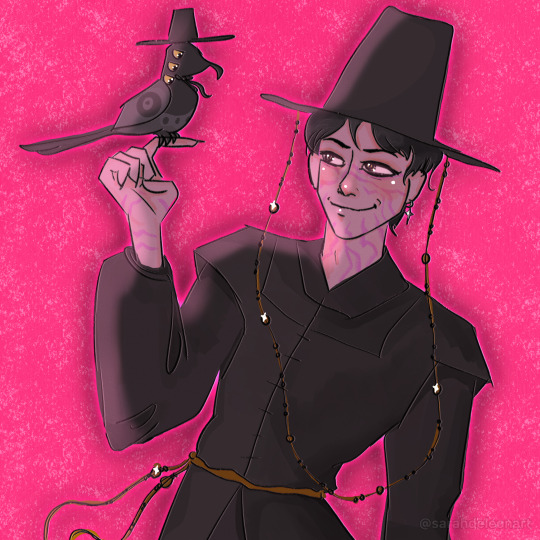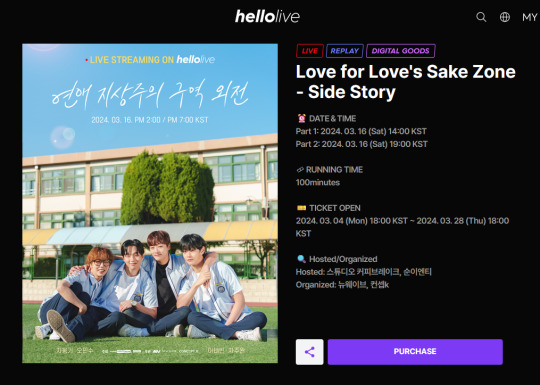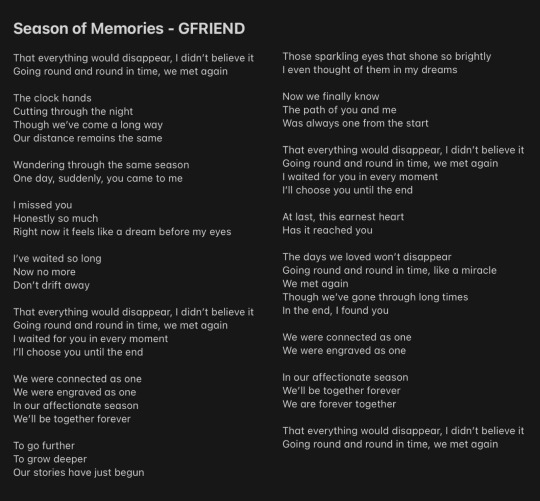#korean performance
Explore tagged Tumblr posts
Text

Korean 남사당(namsadang) Miku!
#hatsune miku#vocaloid#Korea#art#my art#artists on tumblr#nahnahbananakim#miku hatsune#vocaloid fanart#Korean miku#I was gonna draw a pansori miku but thought this would fit her more#the namsadang originally consisted of men but there was one woman who performed in a namsadang group(바우덕이#)#so yeah. 바우덕이 미쿠
5K notes
·
View notes
Text





RESPECT 🪩 MIN YOONGI & KIM NAMJOON
for @rjshope

#dasha you brought this on yourself#you’re the only reason this song made its way to my playlists#I wanted to do something funky with it just like their performance#I really hope you like your late present#bts#min yoongi#kim namjoon#btsgif#dailybts#dailybangtan#userbangtan#cyphernet#*mine#I really can’t do typography#coloring this was hell#ps I love you dasha#ps2 I really hope this Korean work actually means respect 😂#word*
475 notes
·
View notes
Text
taemin doing jonghyun's adlib in sherlock (originally in clue)
#oh he is amazinggggg god this is SOOOOOOOOOOOOO crazy i cant stop replaying it#honestly have no words i just feel so many different emotions seeing them perform this version#there are so many comparisons to previous shinee world concerts like with the outfits and everything but omg there was one w this clip#right next to the video of jonghyun doing this high note in sw4....i felt goosebumps im telling u!!!!!!!!#anyway. my shinee 5 right by my side...i love u forever im tearing up as we speak#taemin#shinee#btw to whoever is reading this. please go listen to CLUE by korean contemporary band shinee....it is life changing im telling u
232 notes
·
View notes
Text
Cosette calls out for her Papa as Jean Valjean dies.
꿈속에 내 죽음 앞에서 코제트이 눈물 흘렸네 | In my dream, Cosette shed tears at the sight of my death
Here, we can see she actually sheds a tear.
#서경대학교#les mis#korea#korean#university performances#cosette and jean valjean#musical#Hadley's translation may be wrong admittedly!
57 notes
·
View notes
Text

“I made it for the tiger, but the bird keeps taking it”✨ KPOP DEMON HUNTERS
#one thing I’m gonna do is listen to/watch the Saja Boys Your Idol performance again and again and again and again👁️👁️ I CANNOT STOP- !!!🎤🦁🎶#I ended up basing this doodle off Jinu’s Jeoseung Saja outfit in his introduction scene rather than his end performance one#(after lots fo freeze-framing I realized they differ!)#but I couldn’t help but add his little earring here too😁#super in love with this movie its music & all the Korean folklore & history it has led me to research more!✨#I also read that the director Maggie Kang nicknamed the magpie Sussie bc it’s always giving sus eyes👁️👁️👁️ good very good���↕️#kpop demon hunters#kdh#kpop demon hunters fanart#kdh fanart#kpop#kpop fanart#jinu#kpdh#jinu kpop demon hunters#jinu kpdh#jinu kdh#kpop demon hunters jinu#kdh jinu#kpdh jinu#jinu fanart#saja boys#jeoseung saja#artists on tumblr#artists of tumblr#animation#kpdh fanart#magpie#fanart#sussie
27 notes
·
View notes
Text


mmmmmmmmm好吃的糖葫芦crunch
#ok tumblr is where ppl get to know the real thoughts HAH#so the translation for the twrp name i got from a performance they did in shanghai??? which i feel very normal about#but yeah they translated it like 混音Party so i just ended up translating party too#lord phobos is just ‘Lord’ plus a translation based off of how saying phobos sounds like (so it is a gibberish translation lol)#丝 has a lot of meanings but i like to think in this context its refering to how lanky he is LOL#and then i included the korean name too since tanghulu is also popular there#yay!!#twrp#fanart#lord phobos#twrp band#digital art#tanghulu
28 notes
·
View notes
Text
youtube
Secret Relationships cast dance cover of BTS "Spring Day"
#I know we already had this in the tag but this is a different angle / full view#the amounts of times I watched this performance the past weeks 😀#it's fascinating and amazing to see a korean BL cast going the thai BL cast fan meeting way#(also it's so evil polycule coded 😏 )#secret relationships the series#secret relationships#cha jungwoo#kim junseo#cha sunhyung#kim hoyoung#evil polycule#sunghyeon x daon#jaemin x daon#suhyeon x daon#suhyeon x jaemin#suhyeon x sunghyeon#jaemin x sunghyeon
13 notes
·
View notes
Text
“Why is dialogue so emotionally exaggerated in Japanese film?” one reddit user asked.
The response HarryMcFann gave is an incredible primer to understanding Japanese performance style and the media influenced by it (I’m looking at you, BLs and Kdramas).
“Not claiming to be an expert or have a definitive answer here, but these are my two cents based off of what I know about Japan and Japanese film. This is a very general overview. It’s important to note that culture is complex and full of nuances, but this should give a general understanding as to why Japanese films are somewhat exaggerated.
As u/scytheavatar pointed out, Japanese film is influenced by Japanese theater, but that doesn't fully answer your question. For example, you may ask about Western theater as it relates to Western films, and so on (Western theater is exagerated, but films today aren’t). So let’s look at Japanese theater.
The three main forms of Japanese theater are Kabuki, Noh, and Bunraku, and each of these forms influenced Japanese films in different ways. Now what is important to note here is that back in the early years of cinema, those in France and the rest of the West saw film as a new form of photography, while the Japanese viewed film as a new form of theater. Just think about that for a second, and what the implications are. Back in the late 19th and early 20th century the big thing about photography was it’s ability to capture realism, and that realism was a huge concern for many Western filmmakers. The famous French film critic, André Bazin, wrote extensively about how he believed the essence of cinema is its ability to reproduce reality (there were, of course, Western filmmakers who rejected this notion, such as the Soviet formalists and German expressionists, but going into that would require a lot more words). In Japan this was not the case, and from its inception, the Japanese rejected the Western idea of cinematic “realism.”
How did this manifest itself in early Japanese cinema? One thing the Japanese directly took from theater was the presence of a narrator. Japanese silent films were always accompanied by someone called a Benshi (fun fact, Kurosawa’s brother was a benshi), who would narrate the film. Japanese silent films would then have few intertitles, because the benshi would be there to explain the plot, and so on. What’s more, audiences would often attend a film based off of which benshi was performing. The benshi where local celebrities in many ways, and they would try to one-up one another. So naturally, to give a good show, the benshi would have to exaggerate in order to give more life to the performance (these guys would voice characters and play all the different roles). Directors would make their films knowing that there was going to a benshi present. So popular was the benshi, that much of the resistance to transitioning into talking films was from those lamenting the loss of the benshi narrators. Japan actually finally made the transition into talking films much later than the rest of the world.
It is also important to understand that “realism” is a relative term (cue some 15-year-old calling me pretentious). Yes, Western theater is also exaggerated and not particularly realistic, but traditional Western theater really doesn’t compare to Japanese theater. In fact, the famous German playwright, Bertolt Brecht, based many of his ideas of modernism in theater on traditional Japanese theater. This is why Ozu is seen as the most “traditional” of Japanese filmmakers while also being viewed as an early “modernist.” (It’s all really confusing and requires a bunch of quotation marks). Anyway, the Japanese don’t really have the 4th wall in theater the same way we do here in the West. In Japanese theater, audience interaction is huge, and stagehands (albeit often wearing black) walk freely on stage and move props and scenery around the actors, and so on. The key difference here between Japanese theater and Western theater is that while the West try to disguise and mask the artifice of the stage, the Japanese embraced it. A quick example of the way a Japanese actor performs in theater would be the Mie. The Mie is a powerful and emotional pose struck by an actor, who then freezes for a moment. This pose is more for the audience than the drama of the play, and often times reveals important information about that character. This idea of the artificiality of the performance in theater can also be seen in Japanese film.
Finally, it is worth noting how the Japanese view nature vs how the West does. In the West, we look at the natural as being something untouched by people. Interestingly, this isn’t really the case in Japan. In Japan there’s a belief that something only becomes “natural” when it has been in some way shaped by a person. Weird, right? To quote Donald Richie:
“To most Japanese, the Western idea of “realism,” particularly in its naturalistic phase, was something truly new. All early Japanese dramatic forms had assumed the necessity of a structure created through mediation. The same was true of Japanese culture in general: the wilderness was natural only after it had been shaped and presented in a palpable form, as in the Japanese garden, or flowers were considered living (ikebana) only after having been cut and arranged for viewing. Life was thus dramatically lifelike only after having been explained and commented on. Art and entertainment alike were presentational, that is they rendered a particular reality by way of an authoritative voice (be it the noh chorus or the benshi). This approach stood in marked contrast to the representational style of the West in which one assumed the reality of what was being shown.”
I want to make it clear that not all Japanese films are like this. If you watch films by a director like Hirokazu Koreeda, you will not see the same sort of exaggeration.”
#bl drama#performance studies#Japanese bl#Thai bl#ql drama#korean bl#kdrama#anime#the world is wide#and history is long
46 notes
·
View notes
Text




some pics from last night at banpo bridge
#we went for the bridge light show thingy and that did not happen lol#but there was this nice cultural performance#idk what the style of dance was but it was fun plus there were lots of vendors#korea#korean#exchange student#student life#studyblr#langblr
8 notes
·
View notes
Text

Yessss!! Love for Love's Sake cast will have a fanmeeting in Korea (which was sold out like TOO FAST) and now they added an option of seeing them live online!
Let's support the guys, they really deserve to feel all the love, (they are amazing as casts and as actors and friends), let's all watch the livestream *__*
#in a true yohoho and a bottle of rum fashion i will probably be watching and saving the second performance#if anyone wants to record then maybe we could join efforts and take on the first performance?#love for love's sake#love supremacy zone#korean bl#lfls fanmeeting#bl series
70 notes
·
View notes
Text

😭🤍🩵💜
#those lyrics got me so emotional 🥹😭 actually shed tears#this is exactly what buddies have been feeling about GFriend since that cursed day almost 4 years ago#there will never be another group like Gfriend 💫#the song is SO good!! so GFriend (that instrumental! reminds me a bit of my favorite Room of Mirrors + some jpop/anime vibes) no one else#could release something like this… their vocals are insanely good omg every listen gets better 💯 kpop really missed them so much#its nostalgic but uplifting/ hopeful despite those very emotional lyrics#and of course the choreo is amazing 🙌🏼 fun & intricate as expected THE performance queens 🥇 their synchronisation is still perfect#their synergy is truly unmatched 🤍🩵💜#I truly cant stop playing the song im addicted & the mood film is beyond adorable soft & warm 🥹🥰#again THANK YOU FOR COMING BACK TO US 😭 GFriend Forever#gfriend#Season of Memories#10th anniversary#reunion#comeback#january 2025#music#kpop#girl groups#ggs#new release#emotional#lyrics#translation#korean
14 notes
·
View notes
Text


no words it’s just—
#HUENINGKAI???????#that was CRAZY omg#😭😭😭😭😭😭💔😭💔💔💔😭💔💔#THE SETLIST WAS crazy ALL of their SOLO PERFORMANCES#i don’t know where to START#THE PERFORMANCES#EVERYTHING WAS SUPERIOR#beomgyu playing korean traditional instruments TYUN’S SOLO DANCE KaI DRUMS??? HE DIDN’T JUST PLAYED DRUMS HE LIVED EVERY MOMENT OF IT#it felt like it was my heart instead of drums HE WAS SO COOL 😭 I DON’T THINK I’LL EVER RECOVER FROM THAT#THE WHOLE STAGE CONCEPT AND VCR FOR GGUM?????? it was so yeonjun and so ggum like LETSGO???#SWAN SOOBIN?????? I WAS EXPECTING SOMETHING SOFT FROM HIM BUT I WASN’T EXPECTING HIM TO TURN INTO A SWAN TRULY#that was so magical... woah.......#the details everything was so perfect how is that possible..........#their outfits TOOO LIKE THE LITTLE DETAILS ON THEM THEY WERE SO PRETTYYYY#i’m not EVEN gonna TALK about the resist and danger stage because. i-#😭😭😭😭😭😭😭😭😭😭😭#tubatu made a great job in a short amount of time i can’t belive it 😭 it was a episode 2 but it felt like a whole different concert really#proud of you🫳🏼🫳🏼🫳🏼#tu’s moa diaries (tu’batu wari wari) 🌟#act: promise ep.2#in incheon
8 notes
·
View notes
Text

Uh huh, listen boy
My first love story

it was funnier in my head
Also I referenced their neon skinny jeans looks, but I used this pic as the pic reff
#slam dunk#hanamichi sakuragi#sakuragi hanamichi#강백호#Akagi takenori#Rukawa kaede#Mitsui Hisashi#Ryota Miyagi#Slam Dunk fan art#U can take the girl out of KPop twt but u can never take KPop out of the girl#Think of this as a modern au of them performing this for school event or whatever it is called#generally not a ship related post but I'd say there's a bit of the ships there... Except for Akagi#Yohana#Hanayo#Mitsugure#RyoAya#Senru#Rukawa's shirt is “love Daehyup” a.k.a Sendoh's Korean name#슬램덩크#북산#북산 농구부
17 notes
·
View notes
Text
i do kinda wish shinee would give some love to their japanese discographies when they're on tour outside of japan
#was secretly hoping for mars at the taemin concert or into the rhythm#closest we got was korean v of sayonara hitori#but i love their japanese songs as much as their korean ones and they almost never perform them outside of japan!!!!#shinee#taemin#key#minho#onew#jonghyun
7 notes
·
View notes
Text
lisa rosalia new woman being on “top kpop songs of 2024” lists is so funny to me like she didn’t even take that to the music shows…
#kpop being defined as anyone who ever performed on a Korean music show bc xg and katseye are certainly not kpop 😭#did katseye ever do a music show… i guess they performed at the MAMAs
7 notes
·
View notes
Text
T.O.P is going to game the fuck out of that squid
#said while trembling like a chihuahua#hes the dude with the ourple hair in the trailer#this is about squid games season 2 which i originally wasnt going to watch but like#t.o.p#korean idol music posting on main ruh roh#< no longer cares#big bang#mama 2024 performance on the mind too#zeal talks
10 notes
·
View notes